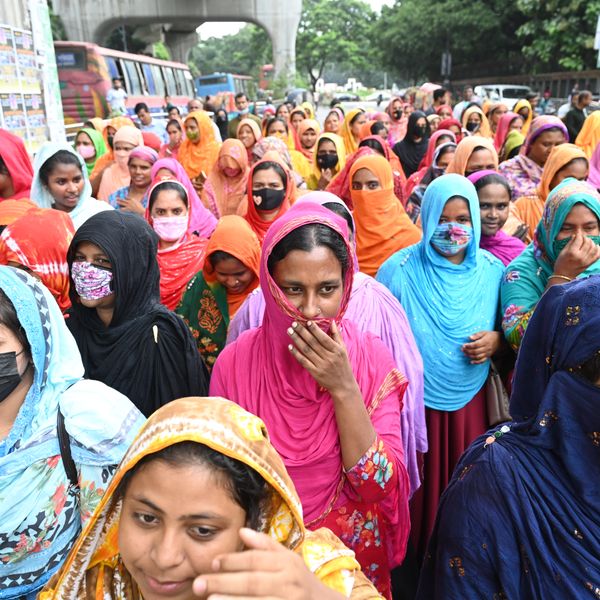TAMPA, Florida - Chanting "No more slaves! Pay a living wage!", hundreds of farmworkers, students and others marched 22 miles through central Florida for three days, calling on the Publix supermarket chain to pay an extra penny to the impoverished workers who pick their tomatoes.
The three-day long march was organised by the Coalition of Immokalee Workers (CIW), a collective of Mexican, Guatemalan and Haitian migrants based in the small south Florida town of Immokalee. The procession passed through the cities of Tampa and Plant City, and then culminated with a rally in Lakeland, where Publix corporate headquarters is located.
The farmworkers are calling on Publix to pay them a penny more for every pound of tomatoes they pick, which would almost double their meager wages. They also want Publix to sign onto a code of conduct, co-written by the workers themselves, which would prevent the supermarket chain from buying tomatoes from any growers that did not meet certain basic working conditions.
"We get paid 45 cents for picking a bucket of tomatoes," says farmworker Wilson Perez.
The workers have to pick about 4,000 lbs of tomatoes per day (1,818 kg) to earn more than 50 dollars a day, a pay rate that has remained virtually unchanged since 1980, accounting for inflation.
Farmworkers in the U.S. are also exempt from many employee protections - they have no right to overtime pay and cannot organise unions.
"We are asking for real social responsibility from Publix Corporation," said CIW co-founder Lucas Benitez, at the kick-off of the march. "Publix says they support families. So why don't they support our families?"
Since 2001, the CIW has waged successful campaigns against fast food chains, food service providers, and now supermarkets - always calling for the same penny per pound raise and binding code of conduct agreement.
Yum Brands, which owns Taco Bell and several other chains, was the first to agree to the CIW's demands in 2005; they were followed by McDonalds, Burger King, and Subway. More recently, pressure from college students allied with the CIW led to agreements with food service providers Aramark, Bon Appetit and Compass. Health-oriented supermarket company Whole Foods also signed on in 2008.
Farmworker and CIW organiser Gerardo Reyes Chavez says the goal of the "Campaign for Fair Food" is to make U.S. citizens more aware of where their food comes from. "This movement, it's aiming not just to change the mentality of Publix, but it's aiming to change first and foremost the mentality of the consumers so that we can achieve greater changes."
The "Farmworker Freedom March" featured a box-truck turned into a traveling exhibit about farmworkers being beaten, and even kept captive as slaves in the modern agricultural industry, an extreme example of the lack of rights afforded to the mostly immigrant workforce in Florida who provide about half of the tomatoes for the entire United States. (See sidebar for more on the Florida Modern-Day Slavery museum).
"The workers are being exploited and it's not just," said Natalia Margolis, a college student who came from Washington DC for the march.
Margolis learned about the CIW from a group at her school called the Georgetown Solidarity Committee. Support from college students has been key to the CIW's campaigns throughout the past decade. Most significantly, students kicked more than 20 Taco Bell outlets off college campus as part of a four-year boycott which began in 2001.
"Since a lot of these corporations are targeting students as their audience, or who they are advertising to, I think students have a lot of power," said Margolis.
The CIW has also written letters to several other supermarket chains with the same demands. Publix would be the first mainstream supermarket to sign on with the CIW, which Chavez says would be an opportunity for Publix to "set an example for other corporations in the world of the supermarket industry".
The CIW's campaigns are based on the notion that companies that buy the tomatoes have a responsibility to make sure everyone in their supply chain is paid fairly. So far, Publix has responded by claiming that wages are determined by the growing operations, not by the supermarket. And Publix spokesperson Shannon Patten says she's satisfied the growers who supply Publix all pay minimum wage.
"This is a labour dispute between the supplier and their employees. It's not something that Publix is involved in, and it's not something that we're going to get involved in," she told IPS.
Publix, which has more than 1,000 supermarkets in the Southeast U.S., brought in 24 million in revenue last year and made a profit of over a billion dollars.
"They are trying to escape responsibility," the CIW's Chavez responds. But he's confident the farmworkers will prevail and Publix will grant their demands.
"It's just a question of time. We are going to continue pressure," he said. "We know what we deserve and we are entitled to a decent way of living, we are entitled to our human rights."


